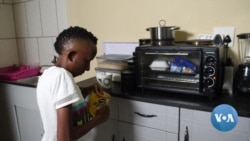From navigating shopping centers to government offices, South Africa’s “little people” say public spaces aren’t designed to be accessible for them. One advocacy group in Johannesburg is calling for better support to help them live independently.
“Different,” “abnormal” and “very small.”
Those are just some of the words Olivia Radebe — who was born with a condition that restricted her growth — says have been used to describe her.
The 27-year-old writer says her late grandmother encouraged her to persevere with her studies and with living independently — and she has. But Radebe says she still faces practical challenges navigating life in Johannesburg.
“You cannot ask help and not pay someone, you know. … Because I’m not on a permanent job and also the money that I get from the government is not enough to sustain me to that certain level whether I can afford to pay everyone and anyone, like it’s a bit of a challenge. So, in other words, I have to beg someone to help me,” Radebe said.
There are hundreds of causes for restricted growth — the most common being achondroplasia, a form of dwarfism that results in short arms and legs. Radebe was never diagnosed as a child.
Now, she says it would be too costly to go to a private specialist to find out. Radebe says she sometimes wonders what her underlying health issue is.
“Because at a later stage, I might be having other complications. … So, if I was diagnosed earlier, maybe I would have known that, okay, fine, in 10 years’ time, I should expect this, I should live like this. There are certain things that I need to avoid in order for me to [have] a long life,” Radebe said.
Specialized health care isn’t evenly available across the country. Parents have to look to big cities like Cape Town and Johannesburg to find the best resources for their children who show signs of restricted growth.
Rachelle Petersen, a member of Little People South Africa, has a son with achondroplasia.
“Our hospitals in areas, like impoverished areas, where there’s a day hospital. So, a parent will go and take the child but the nurses, the doctors are not aware of the condition that the child has,” Petersen said.
Raising awareness about people with dwarfism is one of the main reasons why Piet Nel established the non-profit Short Statured Persons South Africa.
“We can share ideas and come together and also that the public can know what we are about,” Nel said.
The 57-year-old says he has struggled with accessibility and discrimination throughout his life. Nel says the organization gives people like him more power to advocate for themselves and their unique needs.
“That’s why they say, ‘Nothing about us without us.’ You can’t do for us; we must talk for ourselves. Like I say, we must stand together and fight for our rights,” Nel said.
And the country, he added, is starting to listen. Nel’s group met with South Africa’s social development minister to discuss their health and reproductive needs that go unaddressed. He hopes it will be the first step toward bringing more support within their reach.





